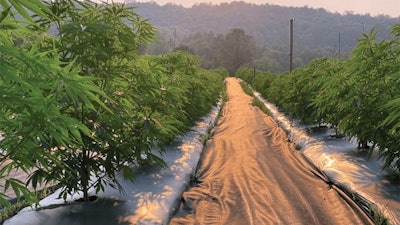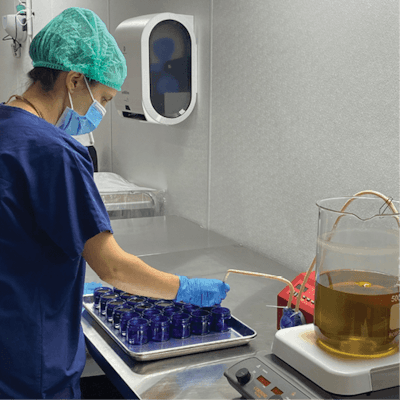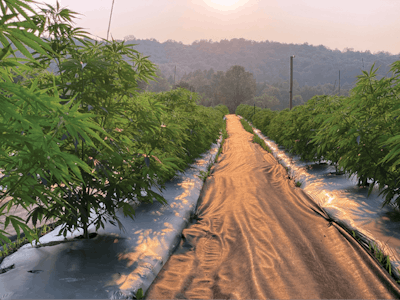

A new day is dawning for Massachusetts hemp producers, as sales that were once restricted are becoming more common.
Hemp Grower spoke with multiple Massachusetts hemp business owners and a cannabis business representative, all of whom are on the leadership council of an industry organization called the Massachusetts Hemp Coalition that has been gathering support for changes in the state’s industry.
Laura Beohner, owner and president of hemp processor and manufacturer The Healing Rose in Newburyport, Mass., has benefited from being able to sell her cannabinoid topical products and tinctures into adult-use cannabis dispensaries since May 2021. “We’ve, in some months, at least doubled our revenue from previous and almost tripled our revenue in other months,” Beohner says.
‘Survive and Thrive’
Massachusetts’ hemp-cannabis coalescence is the result of the state legislature’s 2020 passage of the MA Hemp Industry Survive and Thrive amendment, which allowed hemp producers and processors to begin selling some of their products to state-licensed cannabis dispensaries. The Massachusetts hemp industry’s regulatory body, the Massachusetts Department of Agricultural Resources (MDAR), and the state’s cannabis industry regulator, the Cannabis Control Commission (CCC), began subsequently updating their regulations this year.
“The nice thing about the Survive and Thrive amendment was it was a lifeline for Massachusetts farms; … hemp [that is sold into the cannabis market now] has to be grown under an MDAR license and processed by an MDAR-licensed processor,” says Linda Noel, owner of Terrapin Farm, a cannabinoid hemp grower-processor in Franklin, Mass., that grows smokable flower and biomass and creates bath bombs containing various hemp-derived cannabinoids.
Until 2021, Massachusetts hemp producers had to sell their smokable flower and hemp-derived consumable cannabinoid products, aside from tinctures, out of state, Noel says. (Beohner says the state was following FDA guidelines on CBD). Now, hemp businesses can sell various hemp products to adult-use cannabis businesses. These include finished products, like cannabinoid topicals and tinctures, and industrial hemp products, such as hempseed, hempseed oil, and hemp fiber-sourced materials. (There were no hemp fiber or grain growers in the state in 2021, according to an MDAR spokesperson.)
Massachusetts could also allow hemp processors to sell extract to cannabis formulators as an ingredient as soon as January 2022, if the CCC finalizes proposed regulations that are currently under public comment.
Many of the state’s hemp growers are currently exercising caution about selling smokable flower to dispensaries, Noel says. “MDAR says that we’re good to go and that we can go ahead and sell,” she says. “But I think most of us are waiting for the final vote [in January] and the final document from the CCC just to make sure.” She adds that dispensaries are also waiting to bring in hemp flower because their lawyers are seeking more clarification on the policy in place.
An MDAR spokesperson confirmed with HG that hemp growers can sell finished, packaged, tested, and labeled hemp product to dispensaries. A spokesperson from the CCC says the agency does not have jurisdiction over hemp and hemp-based products and to refer to separate state and federal agencies for more information.

Hillary King is director of wholesale sales at vertically integrated Massachusetts cannabis operation Northeast Alternatives (NEA) and wrote the bill that, with a minor adjustment, became the final Survive and Thrive amendment.
“We were able to get a law changed, which is no small feat, even [with] something small and about hemp,” King says. She adds that NEA plans to stock retail-ready hemp products in Q1 2022.
Jake Zieminski, owner and president of CAVU Hemp, a grower and processor in Cheshire, Mass., says he’s glad businesses, advocates, and the government were able to pass and implement Survive and Thrive. However, he says that with the timing of regulatory guidance around harvest, he took “a loss in 2021.”
“For example, on my side, I’ve got a limit of what I [harvested in 2021, and I was] a little bit behind on the preparation for being compliant and working with retail shops. Is that recoverable? Absolutely. But thinking businesswise, strategically, if I was able to make some decisions 60, 90, 120 days prior to my harvest, it [would make] operations be much smoother,” Zieminski says. But, he adds, “2022 is going to be a big year.”
While some other members of the Massachusetts Hemp Coalition support extending consumable product sales to Massachusetts retail outside the CCC-regulated market, Zieminski would like to keep those sales strictly to cannabis businesses.
“Being in Massachusetts, if we can keep a closed market, we can reward these crafts farmers and keep things local,” he says. “A lot of negative things [came] from COVID, but the reality [is] COVID … did reinvigorate localization. You’ve got people going to their food stands, the farm stands—they’re trying to get different local products. ... It’s not always [best] going to the Walmarts to get everything.”
Time Will Tell
Looking ahead, hemp producers are expecting an uptick in business with the final implementation of the act.
As president of Bay State Hemp Company in Wareham, Mass., John Nathan processes and manufactures cannabinoid products. He says he started his company after he personally benefited from cannabinol (CBN) and became a firm believer in it.
“I truly believe the future is going to be therapeutic blends of cannabinoids with targeted intent,” says Nathan, who worked with King and the state’s legislature on passing Survive and Thrive. “I bet on this years ago, and I have personally seen the consciousness rise of just what CBN is. Lately, we’re getting a lot of calls about THCV [tetrahydrocannabivarin], which is another cannabinoid that we do supply, produce, and manufacture.”
On the whole, the state’s cannabis industry is excited about being able to buy product from hemp producers, says Nathan, who is either working with or in discussion with most of the state’s major cannabis product manufacturers.
Cannabis manufacturers’ support for Survive and Thrive stems in part from the fact that they’ve had to source certain cannabinoids from cannabis-derived THC distillate in the past, Nathan says. He adds that cannabis manufacturers often lost money producing CBN, for instance, from THC distillate, as THC distillate has historically fetched a higher price than bulk CBN.
“A lot of them don’t want to [source CBN] that [way] because there’s an extreme bottleneck on the availability of THC distillate in this state. They licensed a lot of manufacturers and dispensaries, but not enough cultivators,” he says. “So, when they can source that from the hemp side, ready to go, and just use it as an ingredient, it takes a ton out of their R&D, it removes a process that they have to do, and it dramatically lowers their costs.”
As Noel and others support expanding their sales outside of the CCC market, she adds that the state is not yet allowing hemp product to be sold to Massachusetts’ medical cannabis businesses. “That’s a whole other set of regulations …. It has to be a legislative change,” says Noel, a medical cannabis patient. “They’ll go back and change the other law that covers medical dispensaries, and then hopefully let us in there, too.”














